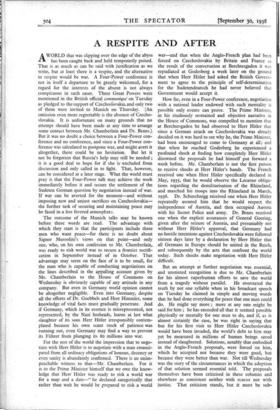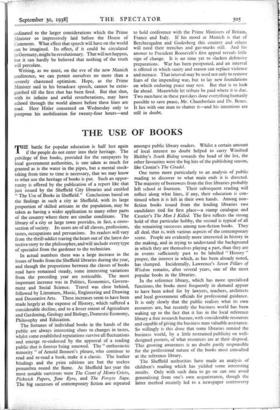A RESPITE AND AFTER
AWORLD that was slipping over the edge of the abyss - has been caught back and held temporarily poikd. That is as much as can be said with justification as we write, but at least there is a respite, and the alternative to respite would be war. A Four-Power conference is not in itself a departure to be greatly welcomed, for a regard for the interests of the absent is not always conspicuous in such cases. Three Great Powers were mentioned in the British official communiqué on Tuesday as pledged to the support of Czechoslovakia, and only two Of them were invited to Munich on Thursday. (An omission even more regrettable is the absence of Czecho- slovakia. It is unfortunate on many grounds that no attempt should have been made at any time to arrange some contact between Mr. Chamberlain and, Dr. Benes.). But it was no doubt a choice between a Four-Power con- ference and no conference, and since a Four-Power con- ference was calculated to postpone war, and might avert it altogether, there could be no hesitation. But let it not be forgotten that Russia's help may still be needed ; it is a good deal to hope for if she is excluded from discussion and only called in to fight. That, however, can be considered at a later stage. What the world must pray is that the Four-Power talk may achieve the work immediately before it and secure the settlement of the Sudeten German question by negotiation instead of war. If war can be averted for the moment—and without imposing new and unjust sacrifices on Czechoslovakia— the further task of securing and maintaining peace may be faced in a less fevered atmosphere.
The outcome of the Munich talks may be known before these words are read. The advantage with which they start is that the participants include three men who want peace—for there is no doubt about Signor Mussolini's views on that point—and only one, who, on his own confession to Mr. Chamberlain, was ready to risk world war to secure a frontier rectifi- cation in September instead of in October. That advantage may seem on the face of it to be small, for the man who is capable of conducting negotiations on the lines described in the appalling account given by Mr. Chamberlain to the House of Commons on Wednesday is obviously capable of any attitude in any company. But even in Germany world opinion cannot be altogether negligible. Even into Germany, despite all the efforts of Dr. Goebbels and Herr Himmler, some knowledge of vital facts must gradually penetrate. And if Germany, which in its essence is misrepresented, not represented, by the Nazi hotheads, learns at last what slaughter of its sons Herr Hitler irresponsibly contem- plated because his own scant stock of patience was running out, even Germany may find a way to prevent its Fiihrer from plunging its 8o millions into war.
- For the rest of the world the impression that to nego- tiate with Herr Hitler is to negotiate with a man emanci- pated from all ordinary obligations of honour, decency or even sanity is abundantly confirmed. There is an unim- peachable witness to that—Mr. Chamberlain. For it is to the Prime Minister himself that we owe the know- ledge that Herr Hitler was ready to risk a world war for a map and a date—" he declared categorically that rather than wait he would be prepared to risk a world war—and that when the Anglo-French plan had been forced on Czechoslovakia by Britain and France as the result of the conversation at Berchtesgaden it was repudiated at Godesberg a week later on the ground that when Herr Hitler had asked the British Govern- ment to agree to the principle of self-determination for the Sudetendeutsch he had never believed that Goireniment would accept it.
How far, even in a Four-Power conference, negotiation with a national leader endowed 'with such mentality is possible only events can prove. The Prime Minister, in his studiously restrained and objective narrative in the House of Commons, was compelled to mention that at Berchtesgaden he had observed to Herr Hitler that since a German attack on Czechoslovakia was already decided on it was hard to see why he, the Prime Minister, had been encouraged to come to Germany at all; and that when he reached Godesberg he experienced- a profound shock at finding how completely Herr Hitler disowned the proposals he had himself put forivard a Week before. Mr. Chamberlain is not the first person to receive shocks at Herr Hitler's hands. The French received one when Herr Hitler specifiCally declared in May, 1935, that he would observe the Locamo obliga- tions regarding the demilitarisation of the Rhineland, and marched his troops into the Rhineland in March, 1936. Dr. Schnschnigg received one when Herr Hitler repeatedly assured him that he would respect the independence of Austria, and then occupied Austria with his Secret Police and army. Dr. Benes received one when the explicit assurances of General Goering, given after the seizure of Austria, and presumably not without Herr Hitler's approval, that Germany had no hostile intentions against Czechoslovakia were followed sixteen days later by a declaration by Herr Hitler that all Germans in Europe should be united in the Reich, and subsequently by the acts that confront the world today. Such shocks make negotiation with Herr Hitler difficult.
But an attempt at further negotiation was essential, and unstinted recognition is due to Mr. Chamberlain for his almost superhuman efforts to save the world from a tragedy without parallel. He overstated the truth by not one syllable when in his broadcast speech on Tuesday he claimed in simple and moving words that he had done everything for peace that one man could do. He might say more ; more at any rate might be said for him ; he has exceeded all that it seemed possible physically or mentally for one man to do, and if as is almost certainly the case, he' was right in saying that but for his first visit to Herr Hitler Czechoslovakia would have been invaded, the world's debt to him may yet be measured in millions of human beings saved instead of slaughtered. Solutions, notably that embodied in the Anglo-French proposals, were forced on him, which he accepted not because they were good, but because they were better than war. Not till Wednesday was the story of the circumstances in which the adoption of that solution seemed essential told. The proposals themselves have been criticised in these colimins and elsewhere as consistent neither with reason nor with justice. That criticism stands, but it must be sub- ordinated to the larger considerations which the Prime Minister so impressively laid before the House of Commons. What effect that speech will have on the world can be imagined. Its effect, if it could be circulated in Germany, might be revolutionary. That will not happen, but it can hardly be believed that nothing of the truth will percolate.
Writing, as we must, on the eve of the new Munich conference, we can permit ourselves no more than a severely chastened optimism. Hope, as the Prime Minister said in his broadcast speech, cannot be extin- guished till the first shot has been fired. But that shot, with its infinite and awful reverberations, may have echoed through the world almost before these lines are read. Herr Hitler consented on Wednesday only to postpone his mobilisation for twenty-four hours—and to hold conference with the Prime Ministers of Britain, France and Italy. If his mood at Munich is that of Berchtesgaden and Godesberg this country and others will need their trenches and gas-masks still. And his answer to President Roosevelt's first appeal reveals little sign of change. It is no time yet to slacken defensive preparations. War has been postponed, and an interval is offered in which sanity and reason can replace violence and menace. That interval may be used not only to remove fears of the impending war, but to lay new foundations on which enduring peace may rest. But that is to look far ahead. Meanwhile let tribute be paid where it is due. Two men have in these past days done everything humanly possible to save peace, Mr. Chamberlain and Dr. Benes. It lies with one man to shatter it—and his intentions are still in doubt.















































 Previous page
Previous page